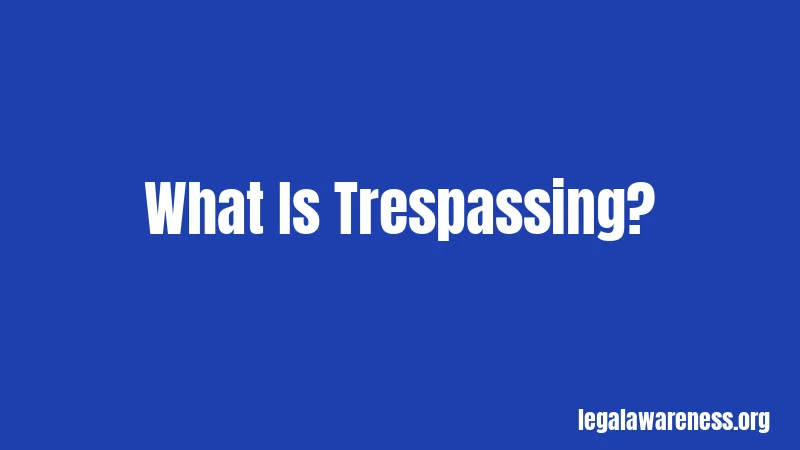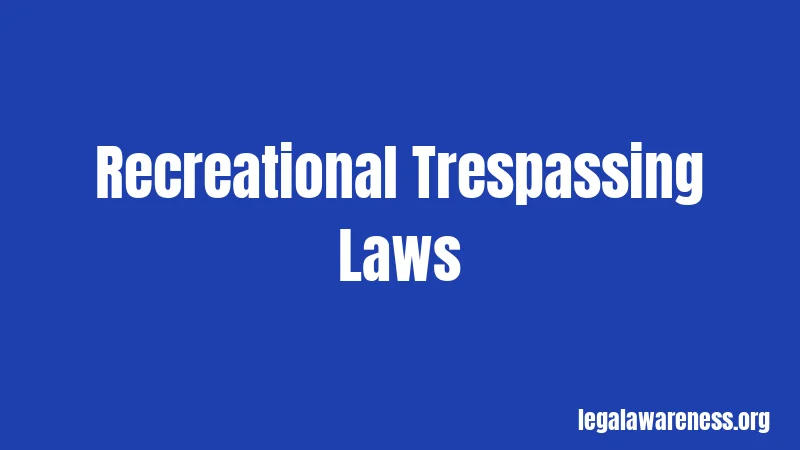Trespassing Laws in Michigan 2026: What You Need to Know
If you own property in Michigan or enjoy outdoor activities, you need to understand trespassing laws. These laws protect property owners while also setting clear rules for everyone else. This guide explains Michigan’s trespassing laws in simple terms so you can stay on the right side of the law.
What Is Trespassing?

Trespassing means entering or staying on someone else’s property without permission. In Michigan, you don’t need to damage anything to be guilty of trespassing. Simply being somewhere you shouldn’t be is enough.
The law considers it trespassing if you know you don’t have permission to be there. You don’t need to know who owns the property. You just need to know you’re not supposed to be there.
Basic Trespassing Laws
Entering Property Without Permission
Michigan law makes it illegal to enter someone’s land after the owner has told you not to come on their property. This warning can happen in several ways:
The owner can tell you in person not to enter. They can also put up “No Trespassing” signs. A written notice also counts as a warning.
Once you’ve been warned, entering that property becomes illegal trespassing.
Staying After Being Asked to Leave
You can also break trespassing laws by staying on property after the owner asks you to leave. This applies even if you had permission to be there at first.
For example, you might be visiting a friend’s house. If your friend asks you to leave and you refuse, you’re now trespassing.
Farm Property Rules
Michigan has special rules for farm property. You cannot enter or stay on fenced or posted farmland without the owner’s permission. The owner doesn’t need to ask you to leave first – just being there without permission is illegal.
There is one exception. You can enter farm property if you’re trying to reach the owner by the most direct route to ask for permission.
Recreational Trespassing Laws

Current Sign Requirements
Michigan’s Natural Resources and Environmental Protection Act requires “no trespassing” signs to be placed so at least one sign is visible from any point of entry. The Department of Natural Resources interprets “point of entry” as any opening in a tree line.
This has caused problems for property owners. Even with many signs posted, law enforcement often won’t prosecute because they claim there isn’t adequate signage.
Proposed Changes for 2025
House Bill 4013 passed the Michigan House in April 2025 with overwhelming support. The bill changes the sign spacing requirement from “one sign at any point of entry” to “posted at intervals of not more than 250 feet along the property boundary”.
The bill now heads to the Senate for consideration. If it becomes law, it will make enforcement much clearer for both property owners and police.
Sign Requirements That Stay the Same
Signs must be at least 50 square inches in size. The letters must be at least 1 inch high. These rules help ensure signs can be seen and read easily.
Penalties and Consequences
Basic Trespassing Penalties
Basic trespassing is a misdemeanor in Michigan under MCL 750.552. You can face a fine up to $250 and up to 30 days in jail, or both.
These penalties apply to most common trespassing situations. The court can impose just the fine, just the jail time, or both.
Recreational Trespassing Penalties
Recreational trespassing carries higher penalties. You can face fines between $100 and $500 plus up to 90 days in jail. Property owners can also sue you for $750 or actual damages, whichever is greater, plus attorney fees.
Serious Trespassing Crimes
Some types of trespassing are felonies with much harsher penalties:
Trespassing on state correctional facility property is a felony. You can face up to 4 years in prison and a $2,000 fine.
Trespassing on “key facilities” is also a felony with up to 4 years in prison and a $2,500 fine. Key facilities include power plants, water treatment plants, and other critical infrastructure.
If you damage property while trespassing, the penalty depends on the value of the damage and your criminal history. For property damage worth $20,000 or more, or if you have two previous convictions, you face up to 10 years in prison and fines up to $15,000.
Special Circumstances

Hunting Dog Retrieval
Michigan law allows you to enter someone’s property on foot to retrieve your hunting dog, unless you’ve been specifically told not to in writing or verbally. You cannot carry a firearm and must leave as soon as you get your dog.
Stream Access
The proposed House Bill 4013 preserves rights for navigating streams. People can still use waterways that cross private property under existing Michigan law.
Process Servers
The trespassing law doesn’t apply to authorized process servers who are trying to serve legal papers by the most direct route.
Emergency Situations
Courts may consider emergency situations as a defense to trespassing charges. If you entered property to prevent harm or injury, this might protect you from conviction.
How to Protect Your Property
Post Clear Signs
Put up “No Trespassing” signs that meet Michigan requirements. Make sure they’re at least 50 square inches with letters at least 1 inch high.
If House Bill 4013 becomes law, you’ll need signs every 250 feet along your property boundary. Until then, follow current law requiring signs at every possible entry point.
Consider Fencing
Fencing clearly marks your property boundaries. It also provides physical barrier to entry. Fenced property gets stronger legal protection under Michigan law.
Document Violations
If someone trespasses on your property, document it. Take photos or videos if possible. Get witness statements. This evidence helps if you need to involve law enforcement.
Contact Police
Call police when trespassing happens. Officers will investigate to see if proper notice was provided through visible signage. If requirements are met, they can issue citations or make arrests.
Send Warning Letters
If you know who is trespassing, send them a written warning letter. Keep a copy for your records. This creates clear documentation that you’ve forbidden them from entering.
How to Avoid Trespassing
Get Permission First
Always ask for permission before entering private property. This includes farmland, wooded areas, and residential property. Don’t assume it’s okay just because you don’t see signs.
Respect Posted Signs
Property owners use signs to provide clear notice of boundary restrictions. If you see any kind of “No Trespassing” or “Private Property” sign, stay out.
Know Your Boundaries
When hunting, fishing, or enjoying outdoor activities, know exactly where you are. Use GPS or maps to stay on public land or property where you have permission.
Leave When Asked
If a property owner asks you to leave, do so immediately. Arguing or refusing to leave turns a simple mistake into a criminal violation.
Civil vs Criminal Consequences
Criminal Trespassing
Trespassing is typically a misdemeanor punishable by up to 30 days in jail and fines up to $250. Penalties can escalate for repeat offenses or cases involving property damage.
Civil Lawsuits
Property owners can sue trespassers for money damages. They must prove there was an unauthorized physical intrusion onto their land. Once proven, property owners are entitled to at least nominal damages.
For recreational trespassing, property owners can collect $750 or actual damages, whichever is greater, plus attorney fees.
Frequently Asked Questions
Do I need permission to hunt on private land?
Yes, you always need permission to hunt on private property in Michigan. Entering agricultural or farm property without permission for hunting is specifically prohibited under MCL 324.73102. Violations can result in fines up to $500 and up to 90 days in jail.
What if I didn’t see any “No Trespassing” signs?
If property lacks adequate signage or signs are obscured, you may have a defense that you didn’t receive proper notice. However, this doesn’t guarantee you won’t be charged. It’s always better to ask permission first.
Can I be arrested for trespassing if I was just lost?
Being lost might help your case, but it’s not automatically a defense. The defense is based on whether you lacked actual or constructive knowledge of the prohibition. If you were truly lost and trying to find your way out, courts might be more understanding.
What’s the difference between trespassing and breaking and entering?
Trespassing just requires entering property without permission. Breaking and entering involves using force to get into a building with intent to commit a crime. Breaking and entering carries much more serious penalties than simple trespassing.
Can property owners use force to remove trespassers?
Property owners should call police rather than confronting trespassers themselves. Michigan law allows reasonable force to protect property, but what’s “reasonable” depends on the specific situation. It’s safer to let law enforcement handle it.
Final Thoughts
Michigan’s trespassing laws protect property rights while providing clear rules for everyone. With proposed changes in House Bill 4013, enforcement may become clearer and more consistent across the state.
The key is communication and respect. Property owners should post clear signs and know their rights. Everyone else should ask permission, respect posted signs, and leave when asked. Following these simple rules helps everyone avoid legal problems.
If you’re facing trespassing charges or dealing with trespassers on your property, consider talking to a criminal defense attorney who understands Michigan law.
